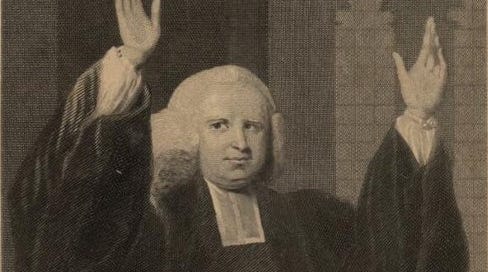Love Divine, All Loves Excelling
First published on May 4, 2023
This week’s hymn is one of the more than 6500 written by Charles Wesley, early Methodist leader and younger brother of John Wesley, the founder of Methodism. The Canterbury Dictionary of Hymnology calls his work the “indispensable nucleus of almost every Christian hymnal in English.”1 The chances that he wrote at least one of your favourite hymns are, I would say, pretty high. This one was first published in 1747, in a collection with the succinct title, Hymns for those that seek and those that have Redemption in the Blood of Jesus Christ. You can listen to the version we sang on Sunday here: https://www.youtube.com/live/htEw6wyGS-Q?feature=share&t=4672
Love divine, all loves excelling, joy of heav’n, to earth come down, fix in us thy humble dwelling, all thy faithful mercies crown. Jesus, thou art all compassion, pure, unbounded love thou art. Visit us with thy salvation; enter ev'ry trembling heart. Come, Almighty, to deliver, let us all thy life receive. Suddenly return, and never, nevermore thy temples leave. Thee we would be always blessing, serve thee as thy hosts above, pray, and praise thee without ceasing, glory in thy perfect love. Finish, then, thy new creation; true and spotless let us be. Let us see thy great salvation perfectly restored in thee. Changed from glory into glory, till in heav’n we take our place, till we cast our crowns before thee, lost in wonder, love and praise.
This is a hymn in the form of a prayer, with three distinct yet interwoven ideas. As we sing it, we are first asking Jesus to come into our hearts; then looking forward to His return to earth; finally anticipating the perfection of Creation on earth and in Heaven. The ideas are simple and lucid, yet so rich. I have been reading it over and over as I try to write this, and each time I appreciate it more.
Over the years, as it has remained in wide circulation, “Love Divine” has been set to a number of different tunes. The one in our hymnal, called BLAENWERN, was composed in the early 20th century by Welsh choir director William Penfro Rowlands, for a different text. When I was searching for information about the tune, I came across this very opinionated comment: “I know it says that you can use Hyfrydol 374 as an alternative tune, but don't do it! Common Praise has got it right: Hyfrydol for ‘Alleluia! S2J’ and Blaenwern for ‘Love Divine’.” So there you have it. I pass that along for what it’s worth.
Actually, though, there is another tune that works very well with this hymn, and it turns out it’s not a hymn tune at all. Wesley clearly modelled the first verse of “Love Divine” on a song from the English opera King Arthur, libretto by John Dryden, music by Henry Purcell. Here is the beginning of Dryden’s text:
Fairest Isle, all isles excelling,
Seat of pleasures, and of loves;
Venus here will choose her dwelling,
And forsake her Cyprian groves.
I see what you did there, Charles Wesley! (And I like it.) It’s what one hymn scholar calls a “spiritual parody.” And so the other tune that fits Wesley’s words is Purcell’s melody for this song. You can hear it here, sung by Maddy Prior, who has done a couple of fantastic albums of hymns by Wesley and his contemporaries:
Timothy Dudley-Smith. "Charles Wesley." The Canterbury Dictionary of Hymnology. Canterbury Press, accessed September 24, 2023, http://www.hymnology.co.uk/c/charles-wesley.




